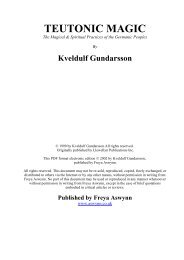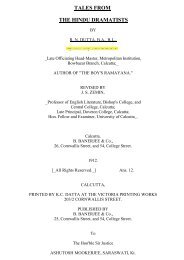Untitled - Awaken Video
Untitled - Awaken Video
Untitled - Awaken Video
You also want an ePaper? Increase the reach of your titles
YUMPU automatically turns print PDFs into web optimized ePapers that Google loves.
Chapter 2. Connections 42<br />
Knowledge as defined above would also have a different feel to it since to be<br />
truly knowledgeable one would not only have to understand the connections between<br />
things or events but would also have to know and understand the layering of actions/<br />
movements in the Well of Urð and how these layers were affecting the surface/<br />
present time.<br />
”The phrase lög leggja is the usual term in Old Norse for the act of making<br />
laws, but the literal meaning of the phrase suggests something else. Leggja<br />
is ’to lay’, ’to place’, or ’to do’. Lög (the plural of lag) is literally ’strata’ or<br />
’that which has been deposited or laid down’. Lög leggja is, then, to lay down<br />
that which has been laid down or to lay down or implant strata. There is a<br />
strong feeling of the physical here. Of course lög occurs again in ørlog seggja:<br />
‘to say or to speak the ør-strata, the ør-things-laid-down, the ør-law’. The<br />
phrase is usually translated as ‘to set fate’, but fate is a non-Germanic word.<br />
If fate’s meaning is to be limited to denoting ‘that which has been spoken’ or<br />
‘that which has been laid down’, then it translates the context well; if not, it<br />
will cause problems.” 32<br />
Knowledge, then, comes from having gained an understanding of the past.<br />
Snorri in the Prose Edda tells of the Tale of Óðinn’s seeking wisdom from the<br />
Well of Mímir:<br />
“But under the root that reaches towards the frost-giants, there is where<br />
Mímir’s Well is, which has wisdom and intelligence contained in it, and the<br />
Master of the Well is called Mímir. All-father (Óðinn) went there and asked<br />
for a single drink from the Well, but He did not get one until He placed His<br />
eye as a pledge (into the bottom of the Well).” 33<br />
One did not gain wisdom or knowledge simply by drinking from the Well; one had<br />
to be able to see the layers/ actions and the currents, the connections, which relate<br />
one stratum to another to understand the true make-up of the surface. For Óðinn<br />
to have knowledge, His eye had to be left in the Well. Knowledge of the past or<br />
“remembering” the events and how they related to one another resulted in “knowing”<br />
the present, and this type of knowledge was within the scope of the Wholemaker’s<br />
skills. And indeed, it has often been the case, that modern collectors of northern<br />
European folklore have found the local “healers” to be some of the best and most<br />
complete repositories of local history, geneologies, as well as tales of the Otherworld.<br />
The Germanic branch of the Indo-European languages separates itself from other<br />
European languages of the same tree in that it does not have a built-in future tense.<br />
32 Bauschatz, p. 6.<br />
33 Snorri, p. 17.
















